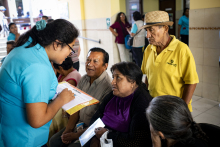Organization of a global research consortium to advance methods for measuring unmet health and social care needs of older people

July 2022 - June 2023
Lead research institution: University of Newcastle (Australia)
Other participating research institutes: The Australian National University (Australia), University of New South Wales (Australia), University of Gothenburg (Sweden), University of Padova (Italy), International Longevity Centre Singapore (Singapore), University College London (United Kingdom)
Principal investigator: Professor Julie Byles AO, University of Newcastle
Global (Based in Australia)
Background
The measurement, understanding and monitoring of unmet need for health and social care is important to accelerating global progress towards universal health coverage. It is also important to specifically understand the different needs of older people compared to other age groups, and how these may or may not be met by available health and social care systems. WKC provided seed funding to establish a global research consortium that could collectively address the methodological challenges and produce evidence that can guide policies to be responsive to the needs of people of all ages.
Goals
- To facilitate a global discussion on current practices and future needs related to the measurement of unmet health and social care needs of older people.
- To establish a global research consortium with a clear research agenda to improve the measurement and understanding of the unmet health and social care needs of older people.
Methods
- Conduct a review of grey and white literature to identify key literature, available data sources, and current tools and methods used to measure health and social care needs of older people globally
- Identify a diverse group of relevant experts through systematic searches of relevant literature and expert databases and snowball sampling
- Conduct semi-structured consultations with the identified experts about:
- terminology and systems for describing unmet needs of older persons;
- measurement criteria, instruments, data, and analytic approaches;
- gaps in data, evidence and methods; and
- value-add of the research consortium.
Results
- Established a multi-national research consortium covering all WHO regions, with a research agenda, terms of reference and governance structure.
- Proposed a global agenda for advancing the measurement and methodology for assessing unmet health and social care needs of older people.
- Developed a model of care access specific to older people.
- Compiled the following resources to aid the advancement of the proposed research agenda:
- Database of key literature
- Database of content and context experts
- Database of measures related to unmet care needs in older people
- Database of sources of data relating to unmet care need that can be used for secondary analysis
- Database of recommended questions to measure unmet care need in older people
- Created a website to house the resources and facilitate their dissemination.
Global Implications
The research consortium provides a platform for global collaboration on research to improve data and evidence on the health and social care needs of older populations, which can then be used to guide policies and funding allocations to reduce the unmet care needs of older individuals. The consortium will facilitate the exchange of best practices and experiences among different countries and regions and will help build capacity for assessing unmet needs in lower- and middle-income countries. The results are expected to improve the comparability of data on unmet need across different places and time periods, allowing for more accurate monitoring of progress toward universal health coverage.
Local Implications
The research consortium presents an opportunity for Kansai-based researchers and institutions to build their international network and contribute to a global research initiative related to a local health priority. The resources compiled by the consortium could be useful for local research and policies.
Publications
- A series of discussion papers and other resources developed during the project are available on the consortium’ website: www.caretrack.online
- WKC Working Paper: Advancing research and global monitoring of unmet health and social care needs of older people – a research agenda (forthcoming)
- Journal articles (forthcoming)

